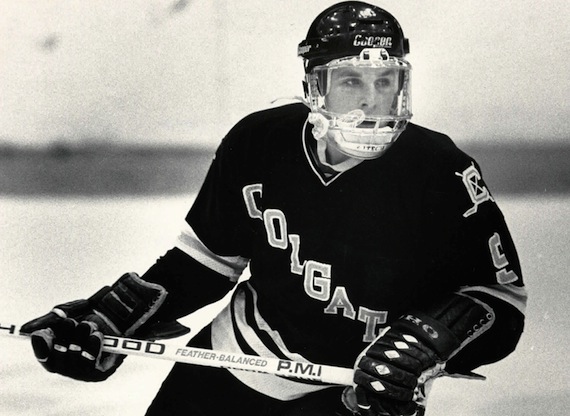
Steve Spott ŌĆÖ90 is the coach of the Canadian junior hockey team
(This post was written by Matt Faulkner and originally appeared on the website.)
Former ║¼ą▀▓▌┤½├Į standout Steve Spott ŌĆÖ90 is going through the selection process for Hockey CanadaŌĆÖs National MenŌĆÖs Junior Team as the head coach and itŌĆÖs a welcomed challenge from a player who learned a lot from his college coach.
Spott played for ║¼ą▀▓▌┤½├Į from 1986-90 and was a major contributor during the RaidersŌĆÖ run to the NCAA Championship game in 1990 and its ECAC Hockey Championship season. He tallied 49 points that season, which was a career-high and he had 14 goals in the final 17 games of the year.
He ended his career 13th on the all-time scoring list with 75 goals and 73 assists. He is one of seven players on the 100-point list to have more goals than assists in his career.
He played under legendary coach Terry Slater and gives him a lot of credit for the position he is currently in.
ŌĆ£I would not be where I am today without Terry Slater,ŌĆØ Spott said. ŌĆ£He is the greatest coach that I have ever played for. For me, I canŌĆÖt say the number of times I have said to myself on a bus or plane, ŌĆśwhat would coach Slater have done in this situation.ŌĆÖ He has had a tremendous impact on my life and on my career now.ŌĆ£
A major component of coaching a team like a national team at any level is being able to motivate and challenge players to work as one. Spott has taken much of what he learned while playing for Slater and applied that to his position.
ŌĆ£I think he was a master motivator and knew what buttons to push,ŌĆØ Spott added. ŌĆ£He had 21 or 22 different athletes and you canŌĆÖt treat them all the same. He had a way of getting the most out of us individually and as a team. I have a team similar to this for Team Canada. As great as they all are, you have to find different ways to motivate. I learned a lot of that psychological part of the game from coach Slater.ŌĆ£
Spott has the task of choosing his team this week in Calgary for the International Ice Hockey Federation (IIHF) World Junior Championship. The coaching staff and scouts will evaluate 37 players in the selection camp. The staff has had its opportunity to look at most of the players through the Canadian Hockey League Subway Super Series with Russia or the Canada-Russia Challenge this past summer.
He also has an advantage right now with the NHL going through another lockout.
ŌĆ£There is so much uncertainty and thatŌĆÖs the challenge,ŌĆØ Spott mentioned. ŌĆ£Right now we have all the best players in Canada available to us, but if the lockout should end, we potentially could have six or seven that could be summoned back to their NHL teams.ŌĆØ
Spott said with the depth of possible players, the camp had to increase the number of invites. ŌĆ£Our initial plan was to have a camp of 29 players and we have gone up to 36 because of that uncertainty.ŌĆØ
He will have to cut the roster down to 23 men by the end of the selection camp. Spott and the scouts have their hands full as 31 of the 37 players were drafted in either the 2011 or 2012 NHL Entry Draft, including 13 first-round selections. The players will appear in three scrimmages during camp with two against Canadian college teams.
Spott is currently away from his regular job as the head coach and general manager of the Kitchener Rangers of the Ontario Hockey League. He has been atop the hockey operations part of the Rangers since 2008-09 after joining the team as an assistant coach in 2001-02. He has won a pair of OHL Championships and won the Memorial cup in 2003 with Kitchener.
This is not SpottŌĆÖs first go around with a national team.
In 2009, he was an assistant coach for Canada at the IIHF U18 World Championships. He then joined Canada as assistant coach during the U20 World Championships in Saskatoon, Saskatchewan, where the team brought home the silver medal in 2010.
Going into camp and the upcoming tournament, Spott once again said the opportunity for success will be determined on how the team plays together.
ŌĆ£When you have a team like we do here, the challenge is managing personalities,ŌĆØ Spott added. ŌĆ£These are all the best players in the world and you have to understand that they are going to have to take less for themselves to achieve the common goal of winning the gold medal. ItŌĆÖs going to be less ice time and less opportunity because of the depth we have.ŌĆ£
Hockey Canada has opened its selection camp for the team that will compete in Ufa, Russia from Dec. 26 to Jan. 5 at the 2013 International Ice Hockey Federation World Junior Championship.
After getting the job on his birthday last summer, he hopes his luck will continue as the team heads into the tournament.